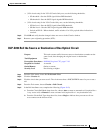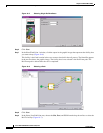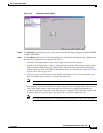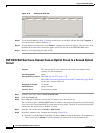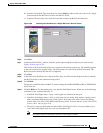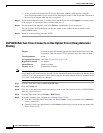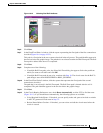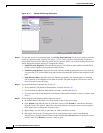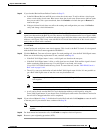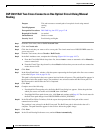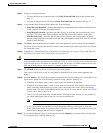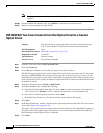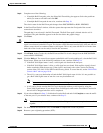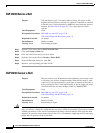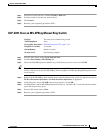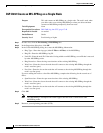
19-39
Cisco ONS 15454 SDH Procedure Guide, R7.2
October 2007
Chapter 19 DLPs D200 to D299
DLP- D236 Roll Two Cross-Connects on One Optical Circuit Using Automatic Routing
Step 16 If you checked Review Route Before Creation in Step 12:
a. In the Roll Route Review and Edit area, review the circuit route. To add or delete a circuit span,
select a node on the circuit route. Blue arrows show the circuit route. Green arrows indicate spans
that you can add. Click a span arrowhead, then click Include to include the span or Remove to
remove the span.
b. If the provisioned circuit does not reflect the routing and configuration you want, click Back to
verify and change circuit information.
Caution If the termination card is a DS3i-N-12, E1-N-14, E1-42 or E3-12 card, a roll will occur even if a valid
signal is not detected on the Roll To port. The absence of a PDI-P downstream for loss of signal (LOS),
loss of frame alignment (LOF), and alarm indication signal (AIS) line defects causes the roll to continue
without a valid signal. This is only seen with DUAL roll mode when both ends of the circuit use the
card(s) that are listed in this statement.
Step 17 Click Finish.
In the Circuits tab, verify that a new circuit appears. This circuit is the Roll To circuit. It is designated
with the Roll From circuit name appended with ROLL**.
Step 18 Click the Rolls tab. Two new rolls now appear. For each pending roll, view the Roll Valid Signal status.
When one of the following requirements is met, continue with Step 19.
• If the Roll Valid Signal status is true, a valid signal was found on the new port.
• If the Roll Valid Signal status is false, a valid signal was not found. Wait until the signal is found
before continuing with the next step. If a valid signal is not found, refer to the
Cisco ONS 15454 SDH Troubleshooting Guide. To cancel the roll, see the “DLP-D240 Cancel a
Roll” task on page 19-44.
• The roll is a one-way destination roll and the Roll Valid signal status is false. It is not possible to
get a Roll Valid Signal status of true for a one-way destination roll.
Note If you have completed a roll, you cannot cancel the sibling roll. You must cancel the two
rolls together.
Note You cannot cancel an automatic roll after a valid signal is found.
• A roll can be forced onto the Roll To Circuit destination without a valid signal by using the
Force Valid Signal button. If you choose Force Valid Signal, traffic on the circuit that is involved in
the roll will be dropped when the roll is completed.
Step 19 If you selected Manual in Step 5, click both rolls on the Rolls tab and click Complete to route the traffic
to the new port. If you selected Auto, continue with Step 20.
Note You cannot complete a roll if you cancelled the sibling roll. You must complete the two rolls
together.
Step 20 For both manual and automatic rolls, click Finish to complete circuit roll process.
Step 21 Return to your originating procedure (NTP).



